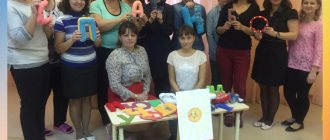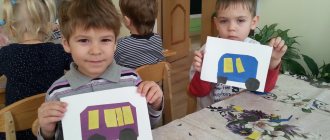The main forms of organizing work with children with speech impairments at the speech therapy center of a preschool educational institution are individual, subgroup classes and classes in small groups.
The predominant form of correctional work in the preschool educational institution’s speech center is individual lessons, because the use of this form of work allows you to successfully establish contact and understanding between the speech therapist and the child. The duration and frequency of individual lessons is determined by a specialist and depends on the severity of disorders of the articulatory apparatus and delays in speech development. Typically, individual lessons last no more than 20 minutes and are held twice a week.
The main goal of an individual lesson is: selection of complex exercises aimed at eliminating specific disorders of the sound side of speech.
Objectives of an individual lesson
| Educational objectives | Formation of the concept of the mechanism of sound formation and its acoustic features; formation or consolidation of knowledge about a syllable, a word, a sentence; consolidation of the dictionary or clarification of words containing a given sound on a lexical topic (this could be “Toys”, “Autumn”, “Shoes”, etc.) |
| Corrective tasks | Development and improvement of articulatory motor skills; formation of rules for oral exhalation taking into account this phoneme; development of phonemic hearing and voice; formation of conditioned reflex connections to a given articulatory-acoustic image |
| Educational tasks | Correction of the child’s personality as a whole. |
Below, I would like to present to you, dear colleagues, the structure of an individual lesson.
Features, pros and cons of the profession of speech therapist
“In their work, a specialist needs to show great patience and restraint,” notes teacher-speech therapist Vita Bilukha. — It is important to have goodwill, communication skills, and intuition. Observation and perseverance, flexibility of mind are required. After all, often the presentation of material has to be rearranged on the fly: you expect one thing, but have to work with another.”
One of the main difficulties of the profession is the need to work with “difficult” children. Without a sincere desire to help, to go through a long path of correction step by step, patience - it is very difficult to cope with the psychological load. Another significant disadvantage is the huge number of documents that a specialist must maintain when working in a budget institution. They either get used to this or go into private practice, where the specialist determines the scope of reporting for himself.
How many hours does a speech therapist work?
The standard work rate in a budget institution is 20 hours a week, that is, a speech therapist works 4 hours a day. This is one of the advantages of the profession: such a schedule allows you not to get tired or overloaded. There is always time left for personal matters, and if you wish, you can engage in private practice in your free time.
How long is a speech therapist's vacation?
Long vacations are another plus of the profession. Its duration is 56 days. And since specialists work in schools or kindergartens, where the educational process lasts from September to May, vacations always fall only in the summer months, which is also convenient.
pixabay.com/
How much does a speech therapist earn?
The salary level does not differ from the usual in the public sector. Depending on the region and place of work, a specialist can count on 17–20 thousand rubles per month. The average salary of a speech therapist in a school is usually higher than in a kindergarten.
“A speech therapist has no career growth as such,” clarifies Vita Bilukha. “But now more and more specialists are going into private practice. Those who have self-discipline and organizational character can achieve good results. In this case, the specialist himself sets the hourly wage.”
According to the expert, only those who like to feel the usefulness of their work and who want to help people become healthier and happier can successfully realize themselves in the profession. And only in second place in importance should come short working hours and long vacations. In this case, the person will enjoy his work.
The structure of an individual lesson at the stage of sound production
- Organizing time
- Articulation exercises: general articulation exercises, special articulation exercises, exercises to develop the strength of the voice and exhalation.
- Announcing the topic of the lesson to the child.
- Sound production (by imitation, from a preserved phoneme, from articulation exercises, by mechanical influence).
- Analysis of articulation according to plan: position of the lips, position of the teeth, position of the tongue (tip, back, root), participation of the vocal folds, nature of the exhaled stream.
- Consolidating isolated sound: pronunciation, onomatopoeia games.
- Development of phonemic hearing: sound recognition in a series of isolated sounds, distant in articulatory and acoustic characteristics, in syllables, taking into account the above recommendations, in words, in sentences, in text.
- Consolidating the pronunciation of sounds in words.
- Homework.
- Result of the lesson: repetition of which sound was practiced during the lesson, analysis of the main provisions of the articulation of the sound being studied, final pronunciation.
- Assessment of a child’s work in class is carried out with a positive psychological focus.
And in conclusion, I would like to note that when preparing and conducting an individual lesson, it is very important to remember that throughout the entire lesson the child must maintain a strong positive emotional attitude, which is expressed in the desire to study. This is achieved by using surprise moments, game fragments, exciting tasks and exercises, during which the learning process turns into an interesting game.
Speech therapy work in kindergarten
Speech therapist advice
Speech therapy work in kindergarten
In our kindergarten there are two speech therapy groups - senior and preparatory to school. They carry out correctional work to eliminate both general and phonetic-phonemic underdevelopment of children’s speech.
Enrollment of children with speech disorders into speech therapy groups is carried out after the decision of the psychological, medical and pedagogical commission.
Preschoolers with various speech disorders are grouped into one age group based on similar levels of speech underdevelopment.
For work, programs and educational kits for children with speech impairments are used, namely:
1. A program for teaching children with underdevelopment of the phonetic structure of speech (for children in the preparatory group for school). Compiled by: G.A. Kashe, T.B. Filicheva.
2. Program for correctional education and upbringing of children with general speech underdevelopment: 6 years of age. Authors: T.B. Filicheva, G.V. Chirkina.
3. We teach you to speak correctly (educational and methodological kit). Author: T.A. Tkachenko.
4. Speech therapy program in a preschool institution. Authors: L.V. Lopatina, G.G. Golubeva, L.B. Baryaeva.
5. A program of correctional and developmental work in the speech therapy group of a kindergarten for children with general speech underdevelopment (4 to 7 years old). Author: N.V. Nishcheva.
6. Preparing children with general speech underdevelopment for school in a special kindergarten (practical guide). Part 1 (first year of study, senior group). Part 2 (second year of study, preparatory group for school). Authors: T.B. Filicheva, G.V. Chirkina.
7. Software and methodological materials for speech therapy classes. Author: L.M. Kozyreva.
8. Program of work with children 4-5 years old with general speech underdevelopment. Author: N.V. Smirnova.
9. A speech therapy program to overcome general speech underdevelopment in children. Author: T.V. Tumanova.
10. Speech motor rhythm. Compiled by: A. Ya. Mukhina, N. Yu. Mikhailova.
Areas of work of a teacher-speech therapist in kindergarten:
— Speech therapy examination;
— Consulting parents;
— Development of non-speech mental functions (attention, perception, memory, thinking, motor skills, visual-spatial skills);
— Development of correct physiological and speech breathing;
— Development of articulatory motor skills and facial muscles;
— Correction of sound pronunciation in children;
— Development of vocabulary and grammatical structure of speech;
— Development of coherent speech;
— Correction of reading and writing disorders;
— Preparation for literacy training;
— Development of fine motor skills of the hands.
Corrective work is a complex multi-stage activity. The complexity of the work arises from many internal and external factors influencing the development of a child’s speech. The speech pathologist is under the watchful supervision of a speech therapist, psychologist, medical worker, teacher, and of course the parents themselves.
The speech therapist conducts frontal, subgroup and individual classes.
Speech correction classes are conducted in speech therapy rooms. They are equipped in such a way that they provide corrective and educational assistance to children with speech disorders. Classes are held at strictly designated hours.
Parents play a major role in the work of a speech therapist, participating in parent-teacher meetings, involving parents in speech work with children, during which it is assumed to organize the correct attitude towards the child’s speech at home and help in completing homework given by the speech therapist. The joint work of the speech therapist with parents also determines the overall success of correctional education. For this purpose, they are carried out; open classes, consultations, workshops, information stands and moving folders are set up.
Speech therapist advice
Very often, children who speak poorly for their age also eat poorly. As a rule, it’s a real problem for them to eat an apple or a carrot, not to mention meat. This is caused by weakness of the jaw muscles, which, in turn, delays the development of movements of the articulatory apparatus. Therefore, be sure to force your child to chew crackers and whole vegetables and fruits, bread with crusts and chunks of meat.
To develop the muscles of the cheeks and tongue, show your child how to rinse his mouth. Teach to puff out your cheeks and hold the air, “roll” it from one cheek to the other.
Do not forget to develop fine motor skills - that is, the baby should work as much as possible with his naughty fingers. No matter how tedious it may seem to you, let your child button up his buttons, lace his shoes, and roll up his sleeves. Moreover, it is better for a child to start training not on his own clothes, but first to “help” dolls and even parents get dressed.
As the child's fingers become more agile, his language will become more and more understandable not only to his mother.
In childhood
very useful to sculpt. Just don’t leave your child alone with plasticine in order to stop his desire to taste the molded ball in time.
Many mothers do not trust their child with scissors. But if you stick your fingers into the rings of scissors along with your children’s and cut out some figures, you’ll get an excellent workout for your hand.
Probably every mother knows when a child
Teeth should grow, when should the baby sit, and when should he take his first steps.
But when he must pronounce sounds correctly, unfortunately, not everyone thinks about it and often realizes it only before the time comes to register the child for school
or
kindergarten
, at best.
Children under the age of three experience age-related tongue-tiedness, when they do not accurately reproduce sounds. Of course, parents understand the speech of their beloved child from infancy, but it is extremely important that at a certain age certain sounds are pronounced:
• 1-2 years - sounds: A, U, O, I, P, B, M • 2.5 years - sounds: G, K, X, J, S, G, K, X • 3 years - sounds: F , S, 3, T, D, N, C • 4 years - sounds: Zh, Sh, Ch, Shch • 5 years - sounds: L, R
If this does not happen before five years, the problem is much more difficult to solve and specialist intervention cannot be avoided.
Among the main speech disorders are:
— dyslalia
- violation of the pronunciation of individual sounds (burring “r”, replacing “r” with “l” or “sh” with “s”; then instead of “fish” - “lyba”, instead of “bump” - “detective”, etc.) . P.); - phonetic-phonemic disorders - when a child not only pronounces, but also perceives incorrectly the sounds of his native language; - general underdevelopment of speech - when pronunciation, perception, and grammar are impaired; - poor vocabulary; - lack of connected speech; - stuttering.
Basic recommendations for parents:
♦ Under no circumstances imitate the child’s incorrect pronunciation, do not “lisp.” Children are quite capable of perceiving correct literary speech. Speak beautifully and competently even with the smallest child.
♦ In addition to the pronunciation of sounds, pay attention to the overall structure of speech. Listen to how the child expresses his thoughts, whether he constructs sentences correctly, whether he agrees words in gender, number, case, and whether he uses prepositions and conjunctions correctly. A five-year-old child should no longer have agrammatisms.
♦ If a child speaks too loudly or, conversely, has a quiet voice, contact an otolaryngologist, as the child may be hard of hearing or have problems with the vocal apparatus.
♦ Watch videos and listen to audio materials that your baby is interested in, because the child will pronounce what he hears. Pay attention: is the dubbing done well, is every word clearly and clearly audible; Is there a layering of translation of foreign products onto the original text? ♦ If you want your child to start learning a second or third foreign language, be sure to consult with a speech therapist and neurologist. Find out whether your child's nervous system is capable of handling such a load. It is recommended to start learning your first foreign language no earlier than 4 years of age.
Remember
that any violations in the pronunciation of sounds that do not correspond to age standards are considered as speech defects, which can be very difficult to correct.
And most importantly
: Parents, do not forget that your speech is a role model.
The importance of family education in the development of children's speech
You
Do you want your child,
as an adult
, to achieve success in life, make a brilliant career, and succeed in business?
Of course, dear fathers and mothers, grandparents, you want your baby to succeed as an individual, to feel free and confident always and in everything.
Then teach your child to speak! He must speak correctly. After all, by learning to speak, a child learns to think logically. Without looking into the distant future, try
assess the current state of your baby’s speech.
The child needs skillful and timely help.
Clean pronunciation, lexical richness, grammatically correct and logically connected speech are the merits, first of all, of family upbringing. And, on the contrary, insufficient attention
to a child’s speech often becomes the main cause of speech disorders.
A speech therapist and preschool teachers will help your child eliminate such defects, form and consolidate the correct articulation of sounds. And yet, you must take on the main burden in teaching your child correct speech.
From you, loving parents, “very little is required - be patient, interest the child and include him in purposeful work. At the same time, we must not forget the basic principles of learning:
• A child should learn by playing.
• You cannot force a child to study. Classes will give the best results when combining different teaching methods.
• The teacher can teach the student only if he himself has sufficient knowledge of the material and pronounces the sounds correctly.
Recommendations from a speech therapist for parents of middle-aged children
Dear fathers and mothers!
Speech therapy examinations carried out annually in kindergarten show that the state of speech of middle-aged children (4-5 years old) often does not correspond to the age norm, but by the age of four all sounds should already be fully formed and used correctly in speech. We will not dwell on the reasons for the trouble.
We will try to highlight the activities that parents who want to hear their children’s clear speech should perform
So:
- Every year, starting from the first year of the child’s life, undergo an examination by a speech therapist at a children’s clinic;
- be critical of the speech manifestations of children, starting from birth, and in cases of any deviations from the norm, contact a speech therapist, without reassuring yourself with the belief that everything will work out on its own;
- Be sure to consult your child with an ENT doctor about the presence of adenoids, since adenoids significantly affect speech, and with an orthodontist. If a child is indicated for adenotomy or bite correction, then do not delay in solving these problems;
- Most children suffering from sound pronunciation disorders have impairments in phonemic hearing, with the help of which we distinguish sounds that are similar in sound or articulation. The speech therapist you contact will teach you how to develop phonemic awareness;
- Attend speech therapy classes with your child, doing homework carefully. Without completing these tasks, without constant monitoring of the assigned sounds, it will be impossible to achieve positive results;
- six months after all the sounds have been delivered, show the child to a speech therapist to check the reliability of the results;
- in case of severe speech disorders, do everything to ensure that the child gets into a speech therapy group in a timely manner. Do not put off resolving this issue year after year by listening to the advice of incompetent people.




